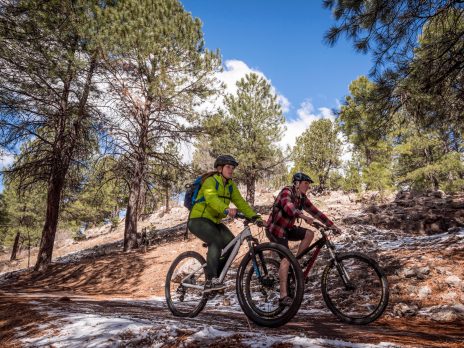Heal the Earth, Heal Yourself
I used to think that there were two kinds of people in this world: those who cared about their own health, and those who cared about the health of the environment. As a fitness wellness major, I thought it was my duty to help people improve their physical health and not much else. I quickly learned that if I really cared about the health of the people around me, I needed to adopt a more holistic approach.
I can see now that having a healthy, mutualistic relationship with the environment is one of the most important, and also overlooked factors of living a wholesome lifestyle.
It may be difficult to understand how environmental health is related to personal health, but our environment, and the way we feel about our environment can have an impact on overall wellness. Let’s start with the obvious:
1. UCAN contribute to a healthier planet.
The most straightforward way that living more sustainably contributes to our health is its direct impact on the world around us. Our earth-conscious decisions can help reduce greenhouse gas emissions, slow the rapid depletion of natural resources, contribute to cleaner water, better air and so much more.
Just because we don’t directly see the CO2 disappear from the atmosphere or a decrease in the demand for unsustainable products, doesn’t mean we’re not making a difference. The hard truth is that we may never even see the effects of our earth-loving actions in our lifetime, but our kids and grandkids sure will appreciate it!
2. UCAN learn how to slow down and be intentional.
There are thousands of actions you can take that will have a positive or at least neutral impact on the environment. The one thing all of these actions have in common is that they take conscious effort to implement. Living a more sustainable lifestyle may force you to slow down and not just mindlessly move through the motions.
I have found that the simple act of hanging my clothes to dry instead of throwing them in the dryer not only keeps my clothes wearable for longer and decreases energy consumption, but it’s also incredibly grounding. While I hang each piece of clothing, I can take time to be thankful for all that I have and to set aside all of the stressors in my life.
Making sustainable changes doesn’t have to be stressful and nit-picky. If you choose to take it one step at a time, the process can help you find presence and gratitude in the small things.
 3. UCAN “accidentally” exercise more and eat better.
3. UCAN “accidentally” exercise more and eat better.
On your sustainability journey, you may find yourself partaking in activities that are incredibly beneficial to your physical health. That bike ride or walk to work instead of hopping in your car is a great way to increase your physical activity for the day. If you choose to decrease your “foodprint” by eating more plant-based whole foods, you might discover that you love the way your body feels after making these nutrient choices. These health enhancing, environment conscious actions might feel different and even better than if you performed them in the pursuit of self-betterment.
4. UCAN let your actions align with your values.
A lot of people say that they care about the environment; many would even venture to call themselves environmentalists. But the list of those actively pursuing an environmentally conscious lifestyle is much smaller.
Believing that caring for the environment is important and not acting in accordance with these views creates cognitive dissonance. This dissonance between our thoughts and actions can result in mental distress and discomfort. Even though no one can be perfect at living sustainably, believing that you are doing the best you can is enough to get rid of that cognitive dissonance.
One of my favorite quotes from Anne Lappé is, “Every Time you spend money, you’re casting a vote for the kind of world you want.” I think this goes beyond just spending money. Every time you make a conscious decision to pick up trash off the ground, bring a reusable cup to the coffee shop, or say no to fast fashion, you have the chance to let your actions reflect your values and to cast your vote for a better planet.
5. UCAN learn to be patient and have grace for yourself.
When I first started to learn about zero waste and plastic free movements, I thought it was important to be fully committed to these practices. I felt that if I wasn’t sustainable in one area, I might as well not try at all. So I shifted all of my routines and material goods to be plastic and waste-free, no matter the cost. I’ll spare you the details of the one time I went a month without washing my hair because I didn’t like that shampoo comes in a plastic bottle, or the time I made my armpits bleed because I tried to shave them with a safety razor… But those can be conversations for another time if you’re interested.
I have since learned that a non-restrictive mentality is the only way to make a sustainable lifestyle sustainable for life. It will be more productive and helpful to focus on the areas and practices that work for your lifestyle rather than beating yourself up for the ones that don’t. I mess up all the time, and in the most loving way possible, you probably will too. The best way to recover is to forgive yourself, think about ways you can improve next time (if it’s worth it) and move on.
If we are trying to love the environment, we have to remember that human beings are part of the environment. A mutualistic relationship can only exist if both sides benefit. If we are hurting ourselves or stressing ourselves out over earth-conscious practices, it may not be worth it for that time being.
When we learn to forgive ourselves for pitfalls in our sustainability journeys, we learn to accept our other downfalls as well. We also learn to have grace for others in their sustainable practices or lack thereof. Judgment and lack of forgiveness towards ourselves and other people are neither helpful nor productive in any aspect of life.
6. UCAN learn to focus on others.
While this entire blog post is dedicated to talking about how caring for the environment affects us personally, I think it’s important to recognize that this shouldn’t be the motivation for our environmental efforts. When we care for the environment, we have the opportunity to forget about our motives and contribute to a movement that is much bigger than ourselves. How exciting is it that we can change the world and make it a better place for the people, plants, and animals that populate it?
If you feel lost and don’t know where to start on your sustainability journey, here are a few actions to consider:
-
Decrease plastic consumption at the grocery store by using reusable grocery bags for produce and jars for bulk items.
-
Say no to single-use items like coffee cups by bringing your own coffee mug or thermos.
-
Cut back on animal products a few times a week.
-
Buy fair trade and organic products when possible.
-
Walk, ride a bike or take the bus instead of driving.
The final tip I have is to be open to new research and information on sustainable living. When you seek your own information, you have the opportunity to filter through and find what is most convicting to you. Then you can adopt a lifestyle of intentionality and holistic health that aligns with your individual values.
